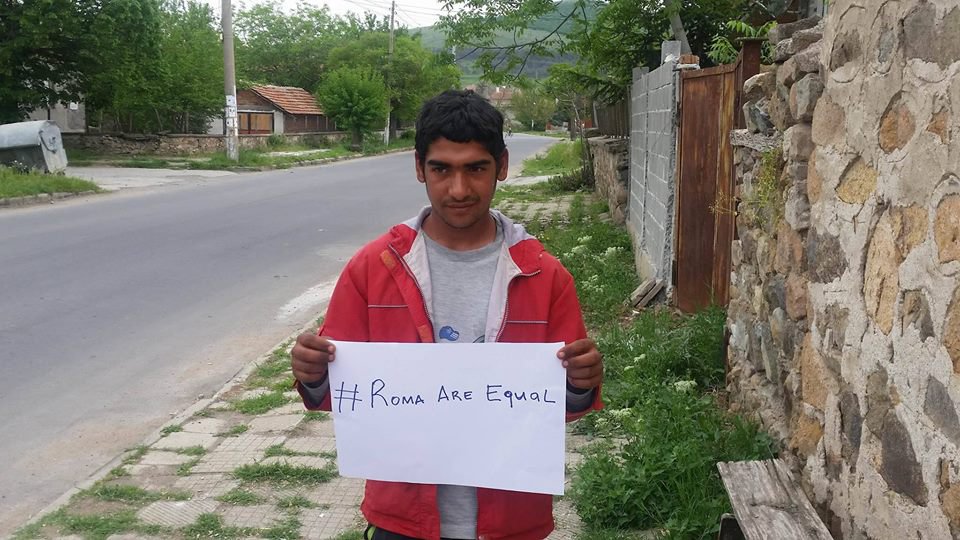What’s so difficult about establishing the racist motive behind racist crimes against Roma?
29 April 2016
In a sickening display on the seventh anniversary of the firebomb attack on a Romani family home, a handful of neo-Nazis assembled in the Czech town of Vítkov to voice support for the arsonists. The attack injured three people and nearly killed toddler Natálka, who sustained third and fourth-degree burns over more than 80% of her body. The first speaker at the rally on the 18th of April issued a call to raise money for “the boys who are in jail”. Other speakers interspersed their abuse of Roma and refugees as vermin and scum with claims that ‘the boys’ received disproportionately severe sentences for the attack; incidentally, a sentiment shared by former President of the Czech Republic, Vaclav Klaus.
 In this case, the racial motive could not have been more blatant: the crime was committed to celebrate the 150th anniversary of the birth of Adolf Hitler; and the neo-Nazi attackers shouted, “You are going to burn alive Gypsies” as they hurled Molotov Cocktails at the family home. They received jail sentences in excess of 20 years each. But evidence and data across many member states in the European Union suggests that when it comes to acknowledging the racial motivation in crimes of violence against Roma, Vitkov was the exception rather than the rule.
In this case, the racial motive could not have been more blatant: the crime was committed to celebrate the 150th anniversary of the birth of Adolf Hitler; and the neo-Nazi attackers shouted, “You are going to burn alive Gypsies” as they hurled Molotov Cocktails at the family home. They received jail sentences in excess of 20 years each. But evidence and data across many member states in the European Union suggests that when it comes to acknowledging the racial motivation in crimes of violence against Roma, Vitkov was the exception rather than the rule.
Bulgaria
It came as no surprise to hear last weekend that the Bulgarian ‘nationalist’ who filmed himself racially abusing and viciously assaulting Mitko, was released from police custody on bail of less than 300 EUR and will only be charged with hooliganism. In this case, outrage at the YouTube video quickly turned to solidarity with the 17-year-old Roma youth, beaten for saying he considered himself equal to his racist aggressor.
The thousands supporting the #RomaAreEqual campaign have shone a spotlight not just on the issue of racist violence, but on the abject failure of the Bulgarian authorities to investigate and unmask racist motivation in crimes against Roma and other minorities; and to prosecute and punish offenders in a manner that might discourage other violent racists.
The European Court of Human Rights has been quite clear about the obligations of states in general, and Bulgaria in particular, when it comes to racially motivated crime. In the case Abdu v. Bulgaria, the court held that: “Treating racially motivated violence and brutality on an equal footing with cases lacking any racist overtones would be tantamount to turning a blind eye to the specific nature of acts which are particularly destructive of fundamental human rights.”
Amnesty International, in its report Missing the Point, makes the point that by failing to ensure justice for the victims of hate crimes, the Bulgarian state creates an atmosphere in which such attacks are likely to be repeated. The practice of dealing with hate crimes as being simply motivated by hooliganism results in no reliable data on hate crime, and even less confidence in the justice system among those communities at greatest risk.
A combination of entrenched prejudice among officials, with a lack of experience in the very practical steps to uncover discriminatory motives during an investigation, encourages the strong tendency to go for the ‘hooligan option’. All that is needed to establish that a crime is motivated by hooliganism is that it took place in a public space, in the presence of witnesses and that the victims and perpetrators do not know each other.
In the context of a degraded democracy where hate speech, inside and outside of parliament, goes virtually unchallenged by the political elites; where a plethora of hate groups and neo-Nazi parties continue to incite hatred against Roma, refugees and other visible minorities; and where media campaigns present Roma as a ‘demographic threat to the nation’, this just ain’t good enough.
As the European Court put it, the ‘hooligan option’ amounts to turning a blind eye to the racist character of such crimes; this in turn creates a permissive environment for hatred and violence against minorities; and stands as stark testament to the state’s failure to meet its specific obligations under international law to combat discrimination.
…and beyond Bulgaria
The problem is of course bigger than Bulgaria; right across Europe local and national courts, prosecutors and police officers fail to adequately investigate racial or discriminatory motives in crimes of violence against Roma.
Why is it so difficult to establish the racist motives that drive racist crimes? It’s not as if racially motivated crime is new to Europe: Europeans have been at it for hundreds of years, whether it’s been pogroms at home, or imperial atrocities abroad. The 20th Century bore witness to racially motivated criminality on an industrial scale that still somehow defies comprehension.
When political leaders piously proclaim ‘Never again’, many need to be reminded that the first step they need to take is to ensure that the law adequately protects minority communities from discrimination and hate crime. They need to takes steps to ensure that law enforcement officials understand their duties are to ‘serve and protect’ without bias. Many states have already done so, thus proving that it is eminently possible to define, investigate and prosecute racially motivated crime. It’s time for the laggards to step up, meet their obligations under international law to stop violent racists from setting agendas of fear and hate, and ensure that the rule of law may prevail without prejudice.




